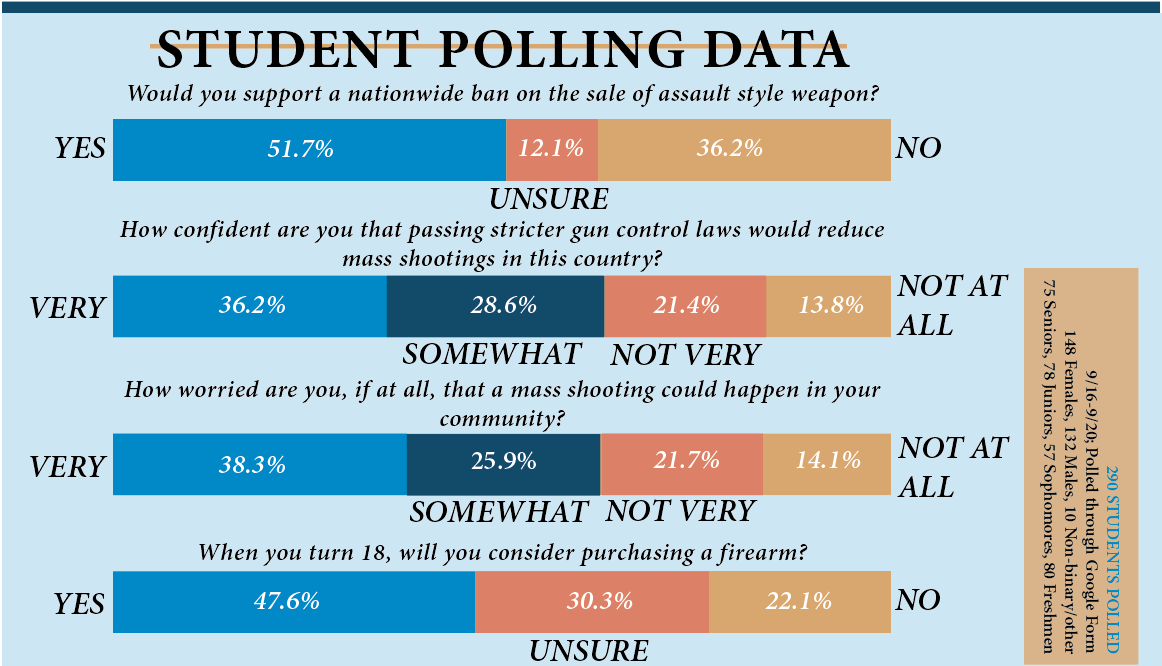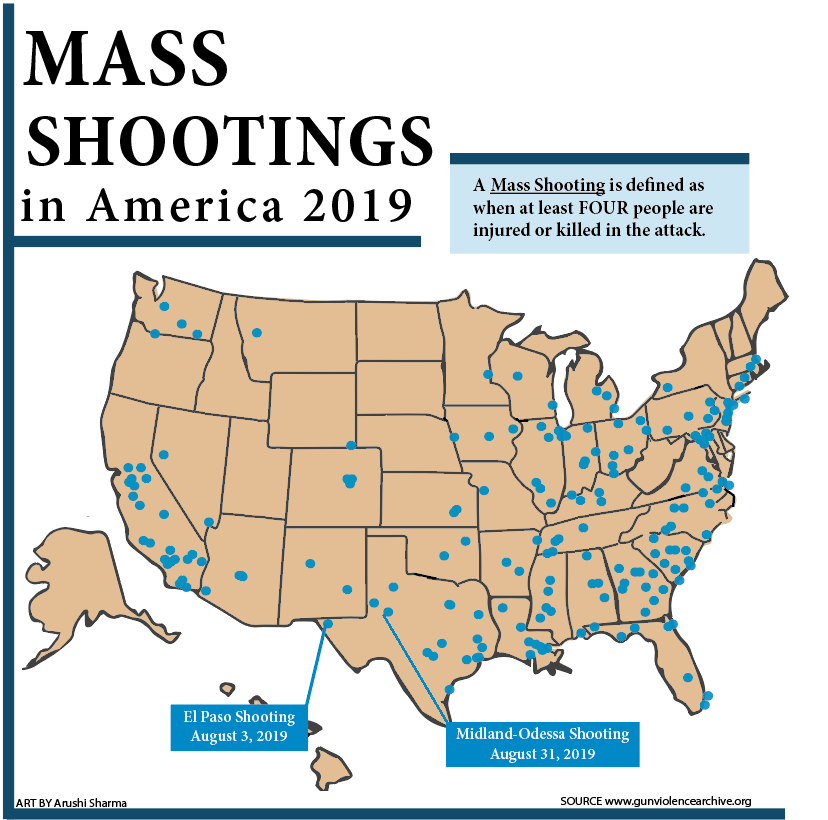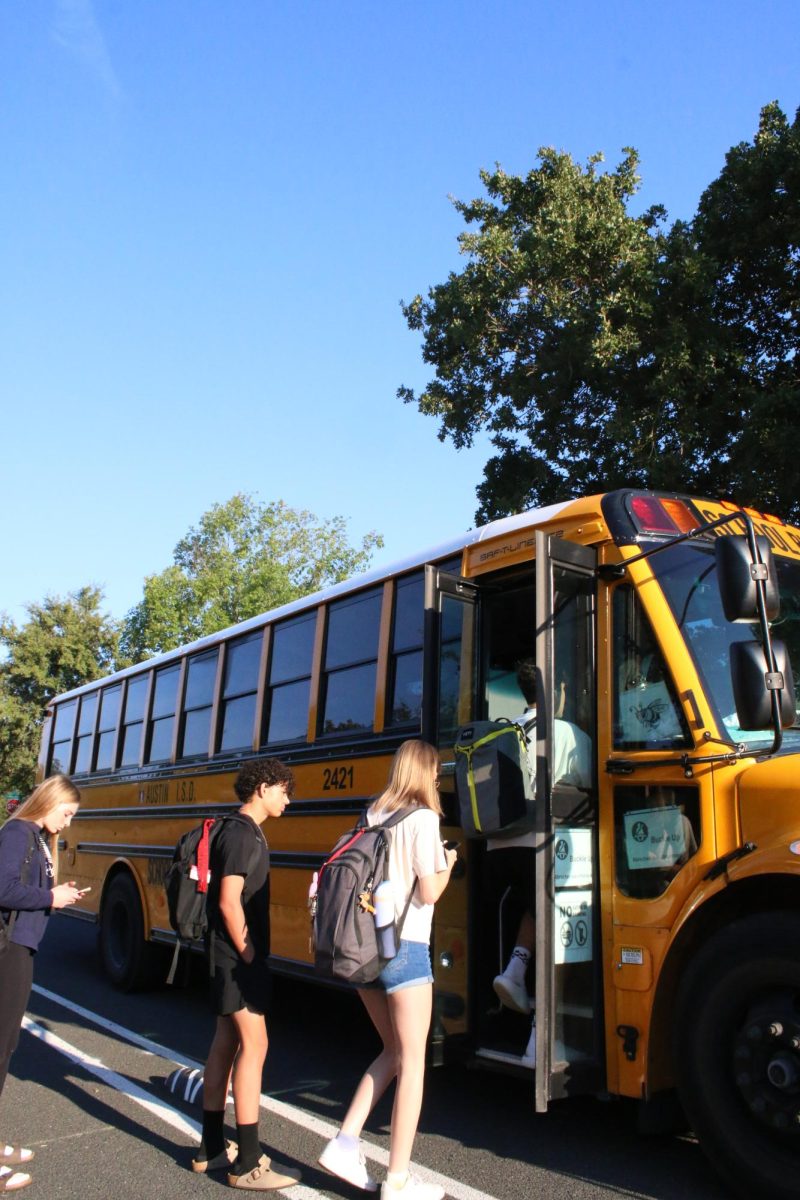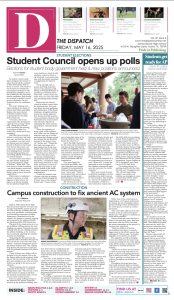Gun control triggers heated debates
The graphic above illustrates how many mass shootings America has had this year alone.
November 4, 2019
Perspectives clash as recent gun violence sparks newfound interest and widespread discussion
In wake of the El Paso and Odessa-Midland shootings that claimed the lives of 30 people, gun violence laments itself as a primary issue in America and a concern for people across the nation. According to Gun Violence Archive, the number of mass shootings in 2019 has reached 310 incidents. Consequently, the topic of gun control has become problematic with polarizing viewpoints and it remains arduous to differentiate between facts and misinformation.
Texas Gun Sense is a statewide nonprofit and nonpartisan organization that advocates for evidence-based policies in reducing gun violence. Ed Scruggs, the board president of the group, has been involved since the Sandy Hook shooting several years ago.
“More people are interested in this issue than ever before and they’re going to carry it with them to the voting booth come next election,” Scruggs said. “Now, I think we have a lot of public momentum on our side where folks on our side are more energized than the other side.”
A position within the gun control debate includes those who believe the right to own firearms should not face limitations. Michael Cargill, owner of Central Texas Gun Works, stated that in a time of uncertainty, people are wanting access to protection in the event of an attack.
“The police are going to take minutes to get [to the scene] and by the time they respond I could lose my entire family,” Cargill said. “People are wanting to put their own protection in their hands because they know that they cannot depend on law enforcement to come and save them.”
Junior Manasa Polavarapu declared herself neutral regarding the issue of gun control. She claimed that, with such a complex issue, definitively choosing a single viewpoint will lead to complications in looking for reasonable solutions.
“It hasn’t directly affected me,” Polavarapu said. “At the same time, others have been affected. I wouldn’t say completely take it away because some people use guns properly, but there are also people who use guns the wrong way.”
Likewise, social studies teacher Alejandro Garcia believes that gun control is such a complex and disparaging issue that finding viable solutions can seem futile in such a misguided and hateful society.
“I don’t think anything will reduce gun violence,” Garcia said. “We are in a society right now where everybody tends to turn to violence. I’m not sure if there’s anything we can do to solve this epidemic of racist, disgraceful violence.”
According to the Stanford Law Center, the sale of firearms increases following a mass shooting. This was confirmed by Cargill, who said that after a mass shooting the sale of firearms and shooting classes increases at Central Texas Gun Works.
“I think more people need to take their own personal protection in their own hands,” Cargill said. “There’s no way you’re going to be able to stop all the evil people that are dead set on committing crimes and committing evil, they are going to commit that evil.”
Political Polarization
As divides grow between those with differing ideologies the debate over how guns should be managed in the United States continues without a foreseeable end. Scruggs expressed disappointment that the divisions within the country may hinder improvements on gun control.
“We live in a very polarizing time in a very divided country: politically and culturally,” Scruggs said. “[Guns] can define someone’s identity, it says a lot about culture, and because of that they also play a big role in the cultural divide that we have in the country.”
It has been a decade since the Columbine High School shooting and a year since the Parkland High School shooting. Schools and the students in them have fallen victim to gun violence. Now both students and teachers must be aware of potential dangers on campus, which Garcia conveyed grief over.
“[School shootings] have crossed my mind, because this is the world that we live in now,” Garcia said. “I think every teacher has thought about what they would do and how they would secure and make sure their students are safe. It’s sad that we have to think about that.”
Sophomore Aidan Barboza believes that gun control is needed in America. However, a quintessential right like the Second Amendment, the right to bear arms, should remain intact since certain people use guns responsibly.
“There are some instances where a gun is needed to protect yourself,” Barboza said. “I do think that the right to bear arms is something that people should have because it is a right that you are allowed. At the same time, that doesn’t mean that you should be able to own all sorts of weapons on the market that aren’t needed.”
As teenagers approach voting age, Garcia said that students must become educated on all aspects of gun control and consider both sides of the issue. He does his part to present students with unbiased information and encourages them to draw their own conclusions.
“Being able to find unbiased information that people can turn to for facts, as opposed to opinion, is very important for teenagers who are in such a very persuasive part of their life,” Garcia said. “I try my best as a teacher to be very unbiased in the evidence I present in history and let those students make their own opinions.”
Mental Illness
A claim in the debate over gun control is that guns don’t kill people, people kill people. This sentiment asserts mental health issues as leading people toward acts of violence. While Scruggs considered the idea, he also claimed that only about 4% of those who engaged in gun violence last year were classified as mentally ill.
“Better mental health treatment would help and possibly reduce some mass shootings or gun violence,” Scruggs said. “I think a lot of times people think the answer to gun violence is just better mental health care for the mentally ill and to fix mental health care, but they’re citing things like anger or impulse issues as mental illness and that’s not necessarily true.”
Widespread mental health screening on all potential gun buyers is considered a possible solution in easing gun violence, but Polavarapu is certain that an idea of this magnitude would be inefficient and essentially impossible.
“You can’t do it for every single person,” Polavarapu said. “You also don’t know who has an illness and who doesn’t because some people hide [mental illness]. This could be a solution, but I don’t think it would practically work.”
The Next Generation
The future of gun control is in the hands of those who have been growing up in a country ravaged by mass shootings, Scruggs stated, and that change will come from the actions of younger generations now.
“You are the generation that’s going to change this,” Scruggs said. “Your generation is coming up in this world and you’ve had to deal with this your whole life, and you’re going to have the experience and the knowledge and the energy to really make change.”
Barboza believes gun control is an issue that everyone must be concerned with, due to the prevalence it has in present day as shootings become more frequent and are a legitimate concern across the nation.
“I think that most everybody should be informed about gun control,” Barboza said. “It’s something that is very relevant right now and is a very serious topic that young adults and people in general need to be educated on.”
Garcia stressed the importance of being aware of the information surrounding such a divisive issue like gun control, especially for students who are approaching the voting age.
“If you don’t understand why people are upset about guns, then you’re not paying attention,” Garcia said. “People informed about actual facts is the best way to stop and curb some of the violence that happens. Educate yourself, find out what people are actually saying, and use that to kind of form your knowledge.”
The debate surrounding gun control is ongoing. Scruggs commented that the tragedies associated with gun violence has permanently changed America and the state of freedom in the country has come into question.
“[America] has lost a lot of innocence,” Scruggs said. “The other side will say that having a firearm is about protecting freedom. We’re a more cynical country, a country that’s more afraid, and that doesn’t feel like freedom to me.”

After taking a poll with 290 students, a clearer image is presented on what students think of guns and related topics.










